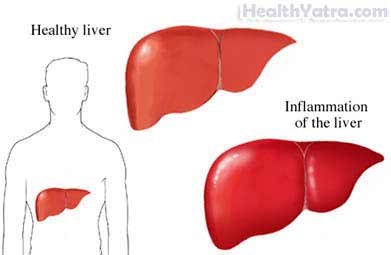সংজ্ঞা
Hepatitis B is a liver disease. It can be acute or chronic. Acute hepatitis B usually goes away on its own and may not need treatment.
Chronic hepatitis B is an infection that lasts more than six months. Chronic infection can lead to other health problems. Hepatitis B is treated with antiviral medications.

কারণসমূহ
Hepatitis B is caused a virus. The virus causes swelling and irritation in the liver and makes it difficult for the liver to function normally.
The hepatitis B virus (HBV) is spread by semen, vaginal secretions, saliva, blood, or body fluids from an infected person. The virus can pass from these fluids to your body through an open cut in your skin.
A woman with hepatitis can also pass HBV to her baby during childbirth.
ঝুঁকির কারণ
Factors that may increase your chance of hepatitis B include:
- Illicit drug injection use, especially when sharing needles
- Unprotected sexual contact, especially with multiple partners
- Sharing a residence and/or personal items with someone who has HBV
- Stay in hospital or long-term care facility
- Hemodialysis treatment
- Work that includes contact with blood or body fluids, such as health care or public safety workers
- Travel to areas where HBV is common
লক্ষণ
It is possible that someone infected with HBV may never have symptoms of hepatitis B.
If symptoms do develop, they appear around 60-150 days after exposure. Symptoms may include:
- Fatigue that lasts for weeks or months
- ক্ষুধামান্দ্য
- বমি বমি ভাব বা বমি হওয়া
- সল্প জ্বর
- Yellowing skin and eyes (jaundice)
- Abdominal pain in the upper right side of the abdomen
- সংযোগে ব্যথা
- Dark urine and light-colored stool
Chronic hepatitis can lead to serious health problems including:
- সিরোসিস
- লিভার ক্যান্সার
- যকৃতের অকার্যকারিতা
- মৃত্যু
রোগ নির্ণয়
The doctor will ask about your symptoms and medical history. A physical exam will be done. Hepatitis B is diagnosed with blood tests. Blood tests are also used to monitor changes in the liver.
For chronic cases, a liver biopsy may be needed.
চিকিৎসা
Acute infection may not need any treatment since it usually goes away on its own.
Chronic hepatitis B may be treated with a combination of different antiviral medications. All medications do not work the same in all people. Talk with your doctor about the best treatment plan for you.
Your doctor may also ask that you:
- Avoid alcohol
- Avoid certain medicines, dietary supplements, and herbs
- Contact recent sexual partners so they can be tested and/or treated
প্রতিরোধ
To reduce your chance of getting hepatitis B, take these steps:
There is a vaccine to prevent hepatitis B. This vaccine, a series of three injections, is routinely given to newborns. Children and teens who were not vaccinated as babies can still receive the shots.
Other prevention strategies include:
- Use condoms or abstain from sex.
- Limit your number of sexual partners.
- Do not inject drugs. If you use IV drugs, get treatment to help you stop. Never share needles or syringes.
- Do not share personal items that may have blood or body fluids on them.
- Make sure a tattoo artist or piercer properly sterilizes the equipment.
- Wear gloves when touching or cleaning up body fluids on personal items.
- Cover open cuts or wounds.
- If you are pregnant, have a blood test for hepatitis B. Infants born to mothers with hepatitis B should be treated within 12 hours after birth.
